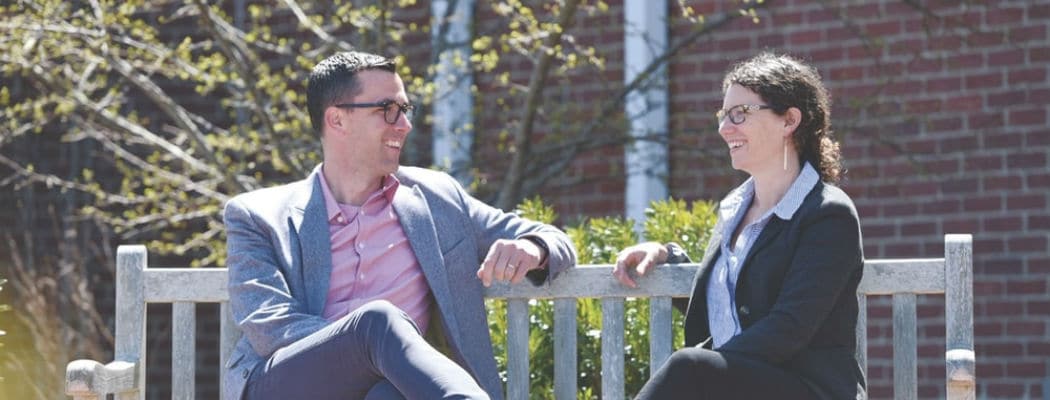Meet newly elected selectmen Jason Bridges and Rita Higgins.
 This spring, Nantucket voted in two new faces to the Board of Selectmen, Jason Bridges and Rita Higgins. As small business owners — Bridges owns Nantucket Bike Tours and The Handlebar Café, and Higgins is the owner and operator of her own landscape design firm — they’re intimately aware of the pressures facing the local economy. Both have been deeply involved in the community as volunteers over the years and are now stepping into new leadership roles as selectmen. N Magazine caught up with Bridges and Higgins shortly after the election to discuss their objectives moving forward.
This spring, Nantucket voted in two new faces to the Board of Selectmen, Jason Bridges and Rita Higgins. As small business owners — Bridges owns Nantucket Bike Tours and The Handlebar Café, and Higgins is the owner and operator of her own landscape design firm — they’re intimately aware of the pressures facing the local economy. Both have been deeply involved in the community as volunteers over the years and are now stepping into new leadership roles as selectmen. N Magazine caught up with Bridges and Higgins shortly after the election to discuss their objectives moving forward.
N MAGAZINE: What are the most pressing issues facing Nantucket today?
BRIDGES: Housing, housing, and housing. I don’t mean to take anything away from important issues such as rebuilding Our Island Home, the contract with Waste Options, or the overfishing of squid in Nantucket waters. Housing stretches across all demographics, all incomes, and all industries… it affects us all.
HIGGINS: Despite all of the work being done to ameliorate the housing problem, it has reached a crisis point where the pillars and longstanding members of the community aren’t choosing to leave — they are forced to leave because there is nowhere to rent. Meanwhile, seasonal businesses are being forced to re-examine how they can open the doors without seasonal housing available.
N MAGAZINE: What are some strategies in addressing the housing crisis?
BRIDGES: There are many angles and strategies that will need to be implemented in relieving some of the stress for our year-round and seasonal community. We have the Affordable Housing Trust Committee in effect, Housing Nantucket doing great work, a RFP out to build workforce housing on Town land at 6 Fairgrounds Rd., the Richmond property starting, and other projects that are currently in the works. But what else can we look into more? How can we change incentives for homeowners to rent out that cottage year-round for an affordable price instead of the summer weekly rental? Can we develop co-op living homes that can serve a younger population?
HIGGINS: We must identify and define who we are building for and we must engage the people who are most impacted: the renters, the small-business owners, and the people who are in a position to have an impact, namely the landowners. Until we do this, we are wasting resources and wasting time. Every time we build without asking the right questions to the right people, we have one less chance to get it right.
 N MAGAZINE: Rita, you’ve also identified the environment, particularly water quality, as a critical issue for the future of Nantucket. How can the island prepare itself for the consequences of climate change?
N MAGAZINE: Rita, you’ve also identified the environment, particularly water quality, as a critical issue for the future of Nantucket. How can the island prepare itself for the consequences of climate change?
HIGGINS: We need to foster resiliency. Resiliency in the face of the unexpected and hard to predict environmental issues that may arise from climate change is found through short-term mitigation, long-term planning, and diversification. Essentially, we must consider what we can do to mitigate our known environmental issues like water quality and flooding in the short-term. At the moment, we simply react to what is happening today. If we really want to address climate change then we need to look at fifty years from now, a hundred years from now. Play out the scenarios on paper. Make plans and then when things happen, we at least have some guidance. The short-term mitigation and disaster management plans need to be accompanied by a long-term discussion about how to deal with the less immediate unknowns. Diversification is a key concept to creating long-term resiliency in a community, and can be applied to everything from ecology to building to the economy. In the face of the unknown, be prepared for what you do know and spread your bets evenly for the rest.
N MAGAZINE: Past selectmen have lamented about how the board can often be rendered ineffective in addressing long-term issues like climate change because it gets caught up in the more immediate minutiae of this complex island. How does one achieve both the immediate objectives while working towards a more long-term vision?
BRIDGES: The Select Board is a team of five. They must make decisions at the weekly open meeting, the board cannot meet outside of the publicly scheduled meeting. This makes decision making transparent but restricted. We are developing a strategic plan, which will help us focus on long-term solutions for our big issues. Spontaneously, small issues can pop up. For example, if a state grant becomes available to help our coastal resiliency, the BOS will be tasked with deciding if we should apply and take on a project related to the grant. These type of opportunities can put pressure on the BOS and town staff. It is important to use partnerships with nonprofits, the state, and stakeholders in order to collaborate on solutions.
HIGGINS: There has to be a prioritization and commitment to define our vision and our goals as a board, which will help us answer the more mundane issues while also allowing us to stay focused on the bigger issues.
N MAGAZINE: What role can summer residents play?
BRIDGES: Where I think we could do a better job is to spend more time engaging our summer residents. Nantucket has a funny dynamic. Nine out of the ten potholes that are fixed, or nine out of the ten teachers are paid by our non-voting taxpayers, those who only reside here for a few months in the summer. Then in April, five hundred year-round residents come together to yell out a “yah or nah” at our annual town meeting. We need greater involvement from both of these groups to have a true representation of our community. So many of our summer residents could help us with short and long-term problem solving. We are missing an opportunity to connect with innovative thinkers and an entrepreneurial mindset that can contribute to solving housing and other issues on the island. Seeking advice from everyone in our community should be a priority for our Select Board.
 N MAGAZINE: What are you bringing to the BOS that was previously lacking?
N MAGAZINE: What are you bringing to the BOS that was previously lacking?
BRIDGES: A week before the election, a man in his twenties asked me, “Why should I vote for you?” I told him that I was going to work my butt off to really listen to everyone and help increase civic engagement. I also said, “Here’s the deal, if you vote for me, I will be asking for more participation from you at some point, on some issue, whatever time you can put in. I might need your opinion on an issue, or I might ask you to attend a certain board meeting. So if you don’t want to be more involved, then don’t vote for me.” In our current political environment, we need to hold civic duty at a higher level. Maybe you can only offer an hour or two a month? Maybe you can only listen to a finance committee from home every once in awhile. Find an issue you believe in and write an email to your local leadership, jump on a work group for four months, there is something for all of us.
N MAGAZINE: How can the processes of the BOS be improved?
HIGGINS: Transparency in the decision-making process and incorporating public feedback into the bigger decisions.
N MAGAZINE: How does Nantucket move into the future and modernize while also retaining its history, which we so cherish?
BRIDGES: This is the million-dollar question! Growth is essential for an economy, so smart planning with a focus on sustainable energies and practices is key. As our island grows, we have a great opportunity and a responsibility to get more people involved in our local government. The only way this works is if citizens of all ages, different demographics, and multiple industries come together in conversation and action.
N MAGAZINE: On this topic of modernizing, Rita, what do you think are people’s fears?
HIGGINS: There are two competing visions of Nantucket that people are afraid of. One is the Nantucket that stops growing and doesn’t have the industry required for a thriving year-round community. The other is the built-up, paved over Nantucket that has lost all its charm and beauty. One side is confident that Nantucket goes through boom and bust cycles and always recovers, while the other is confident we are heading towards a bust cycle that we won’t be able to get ourselves out of. While both are valid concerns, I do think we have to be wary of a negative feedback loop where the more successful we are the more we erode the essence of Nantucket that draws so many people here and keeps so many here. These two versions of Nantucket need to be brought together into one positive vision for Nantucket’s future and strategy for growth. While we know we can’t go back to Nantucket in 1950, we also don’t want to end up the Nantucket of the 1800s where taking a natural resource for granted led to immense wealth, but also to eventual economic and ecological disaster that took generations to recover from.
 N MAGAZINE: Jason, what unique contribution do you see Rita bringing to the Board of Selectmen?
N MAGAZINE: Jason, what unique contribution do you see Rita bringing to the Board of Selectmen?
BRIDGES: Rita brings a great perspective to the Select Board. She lives and breathes her passion for the environment every day. In our short time together on the board, she has proven to be a quick study, great at asking questions, and works well with everyone around her. I see Rita being a great contributor to getting things done during her time on the Select Board. Before and after every meeting we have,I always see Rita engaging with as many people as she can. I really admire that about her.
N MAGAZINE: Rita, same question: What unique contribution do you see Jason bringing to the Board of Selectmen?
HIGGINS: Jason is collaborative, thoughtful and diplomatic. There has been a distinct sense of an adversarial nature of discussion between the town and the public, and I think this is something that Jason is well suited to address and ameliorate. He is a natural diplomat and has a clear earnestness in wanting to make the best decision for the most people.
N MAGAZINE: What motivated you to want to be on the BOS?
BRIDGES: I have been volunteering my time and giving back to the island since I arrived here eighteen years ago. This was the next step for me in making a difference. When making bigger decisions in life, I look through a prism of service and growth. Being elected as a member of the Select Board allows me to serve in a different and greater capacity than I am accustomed and at the same time challenge me to grow as a community leader.
HIGGINS: It was that one moment in time where you feel your experience and your background aligns with the needs of the community — a moment perhaps I have been unwittingly waiting for, a moment when I felt I could go from being a cog in a wheel to having a voice in the process — and I am eternally grateful to Nantucket for the opportunity.






